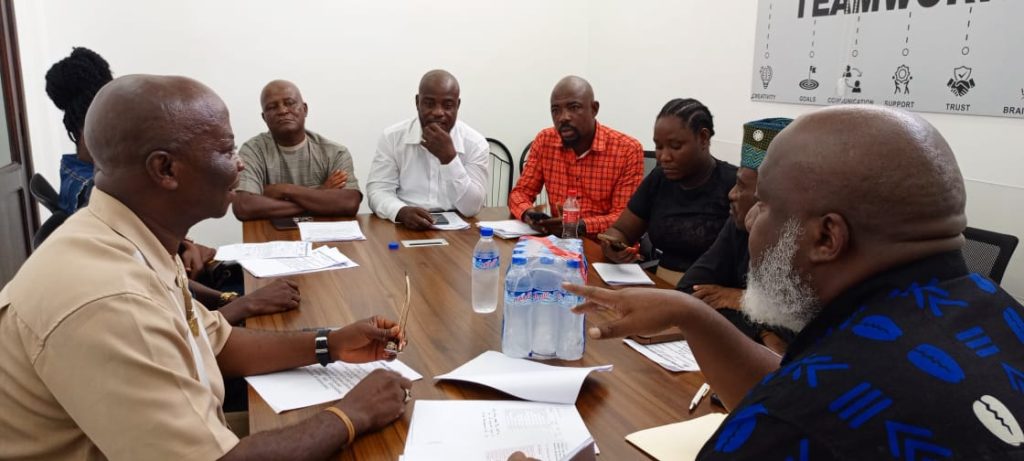On November 26, 2024, the Stevedores Section of the United Seamen Ports and General Workers Union of Liberia (USPOGUL) officially presented a four-point demand for a Collective Bargaining Agreement (CBA) to the Shipping and Stevedoring Association of Liberia (SSAL) during an event in Monrovia. A central demand was the reduction of shift hours from the current 12 hours to a maximum of eight hours for stevedore workers. Adam Washington, President of the Stevedores Section, emphasized that the change in shift duration would help alleviate various health issues faced by workers, including physical ailments and early aging. Additionally, Washington reiterated the urgent need for a wage increment, proposing a US$10 raise for all unionized stevedore positions, particularly in light of the three-year freeze on wage increases, despite rising operational charges by APM Terminals Liberia.
Washington expressed a concern about wage disparity across different port operators, advocating for a unified wage rate across all ports in Liberia. He criticized the current system, where workers struggle financially by having to access credit before getting paid, proposing that wages should be disbursed within three working days following the completion of vessel tasks. This proposal aims to provide stevedores with a more stable financial environment and motivation for their labor. The proposed CBA not only seeks to address wage issues but also targets improvements in working conditions, making it an essential document for negotiations between USPOGUL and SSAL. Washington pointed out that typical CBAs span two years, yet the lingering three-year contract between SSAL and APM Terminals has adversely impacted stevedores, calling for a fair adjustive agreement.
Further amplifying Washington’s sentiments, Freeman Trokon Gueh, the President General of USPOGUL, condemned the practice of SSAL signing contracts with third parties that exclude union involvement. Gueh cited troubling instances where vessel agents failed to honor their responsibilities regarding worker safety and provisions for food, asserting that such oversights would not be tolerated in future agreements. The USPOGUL leadership is adamant about establishing clear accountability and safety provisions in their collective bargaining discussions. They seek to formalize mechanisms that guarantee the health and safety of their members, bringing attention to the responsibilities that agents have in providing for their labor force.
In response to the union’s proposals, SSAL President Daniel Tolbert commended the initiative and expressed his institutional support for the CBA. He acknowledged the importance of maintaining a constructive dialogue between USPOGUL and SSAL, promising that negotiations will prioritize workers’ interests without placing them at a disadvantage. Tolbert also emphasized the involvement of the Ministry of Labor in this process, asserting that their assistance would be crucial in moving forward with the proposed agreement. His optimism about the negotiations highlights a collaborative approach between labor and management to address pressing worker issues and promote a conducive working environment.
The event also featured input from government representatives, including Assistant Minister for Trade Union Affairs, Rufus T. Saylee, who praised the efforts of both parties in prioritizing workers’ welfare. Saylee urged USPOGUL to utilize the Decent Work Act of 2015 and other relevant labor laws to bolster their negotiations. He assured the leaders that the Ministry of Labor is committed to supporting the workers’ cause and encouraged them to formally document their concerns for further review and action. This supportive stance from the government aims to ensure that labor rights are upheld and that the well-being of workers is central to ongoing discussions.
Overall, the presentation of the CBA by USPOGUL represents a significant step towards advocating for better working conditions and wage equity for Liberian stevedores. With key demands focusing on reducing shift hours and increasing wages, the union is taking a proactive approach to protect its members’ health and financial stability. Both the SSAL leadership and the Ministry of Labor have shown willingness to engage constructively, fostering an atmosphere of collaboration that could lead to meaningful improvements in labor relations within Liberia’s stevedoring industry. The diligence of USPOGUL in facilitating these negotiations underscores the vital role that collective bargaining plays in advancing the rights and welfare of workers.














